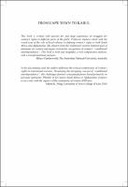Explore

Using her experience of living under apartheid and witnessing its downfall and the subsequent creation of new governments in South Africa, the author examines and compares gender inequality in societies undergoing political and economic transformation. By applying this process of legal transformation as a paradigm, the author applies this model to Afghanistan. These two societies serve as counterpoints through which the book engages, in a nuanced and novel way, with the many broader issues that flow from the attempts in newly democratic societies to give effect to the promise of gender equality. Developing the idea of ’conditional interdependence’, the book suggests a new approach based on the communitarian values which underpin newly democratic societies and would allow women’s rights to gain momentum and reap greater benefits. Broad in its thematic approach, the book generates challenging and complex questions about the achievement of gender equality. It will be of interest to academics interested in gender and human rights, international and comparative law.
This book is included in DOAB.
Why read this book? Have your say.
You must be logged in to comment.
Rights Information
Are you the author or publisher of this work? If so, you can claim it as yours by registering as an Unglue.it rights holder.Downloads
This work has been downloaded 71 times via unglue.it ebook links.
- 71 - pdf (CC BY-NC-ND) at OAPEN Library.
Keywords
- Human rights
- Political control & freedoms
- Political Science
- Politics & government
- Society & Social Sciences
- thema EDItEUR::J Society and Social Sciences::JP Politics and government::JPV Political control and freedoms::JPVH Human rights, civil rights
Links
DOI: 10.4324/9781315583297Editions

